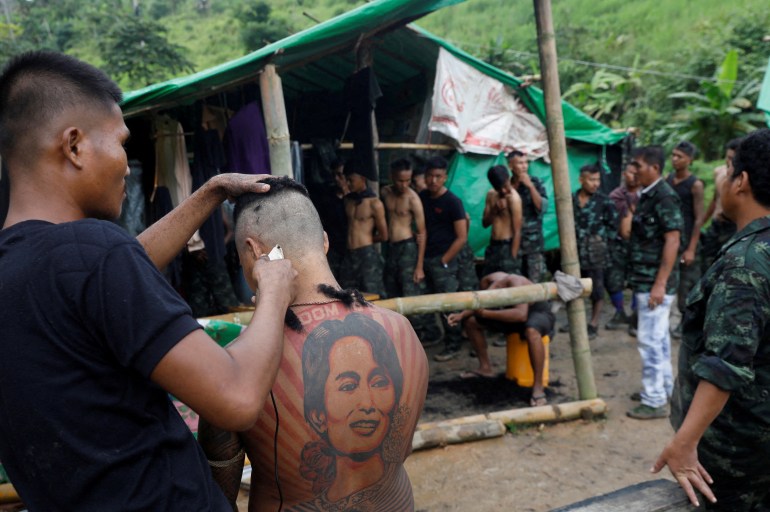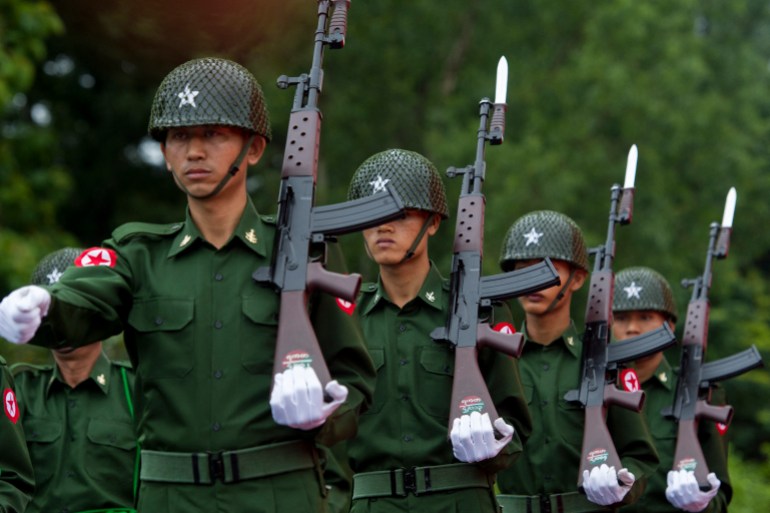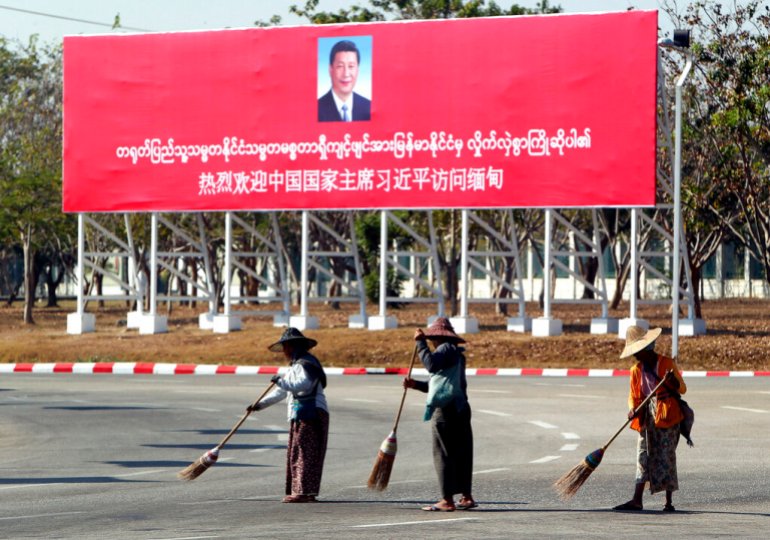This year is likely to be one of the most pivotal in Myanmar’s modern history.
The country is embroiled in a civil war, ignited by the military’s 2021 coup against an elected government.
Fighting has escalated and the military regime, which calls itself the State Administration Council (SAC), has suffered mounting defeats. It has responded to the loss of control over border regions and swaths of territory to opposition forces with indiscriminate air attacks and atrocities against civilians.
The military’s most formidable opposition – a coalition of ethnic armed groups – now controls most of Rakhine state in the country’s east and from the border with China to the city of Mandalay in the north.
Another major opposition force is the National Unity Government (NUG) – described as Myanmar’s shadow government – in exile, which oversees a loose collection of anti-regime groups known as the People’s Defence Force (PDF).
The NUG faces challenges in gaining diplomatic recognition on the international front and its fighters are struggling to capture urban areas on the home front.
Al Jazeera spoke with NUG Acting President Duwa Lashi La about the movement’s military and political strategy in 2025 and the war’s likely end game.
Al Jazeera: Please describe the NUG’s strategy for 2025.
Duwa Lashi La: In 2025, we aim to accelerate the momentum of our revolution. Despite starting with limited resources, the revolution has grown stronger. We formed armed forces in 2022 and launched military operations in 2023. In 2025, our goal is to achieve the final outcome. The people of Myanmar have suffered greatly over the years, enduring numerous atrocities while the world watches on.
In 2025, our objective is to completely remove the regime leader Min Aung Hlaing from our soil.
While armed revolution is a key focus, political inclusivity of all armed forces, strong diplomatic cooperation with the international community, and increased support are also crucial. Effective communication with the public and efficient governance in our controlled areas are essential areas of improvement for the new year. To accomplish this, we have a strategic plan in place.
Al Jazeera: What do you think will happen in 2025?
Duwa Lashi La: Our goal for 2025 is to reach a tipping point, similar to the situation in Syria when al-Assad fled the country. We aim to deal a final blow to the SAC.
International efforts, such as those by the ICC, to prosecute Min Aung Hlaing are supported by us. If the international community could arrest him, it would be a significant step. We will continue our own efforts to prosecute him within our country through all available means.
International intervention is crucial during this transitional period. Through coordinated efforts between the international community and resistance forces against the SAC, we believe the regime could be swiftly dismantled.
It is imperative to cut off financial support to the SAC to achieve this objective. The military benefits from substantial resources acquired over decades of controlling the country. This flow of resources must be halted.
The international community should cease transactions with Myanma Oil and Gas Enterprise, a key financial source for the military. Additionally, selling weapons and providing jet fuel to the military should be stopped.
I strongly urge the international community to disengage with and withdraw recognition from the SAC.
Al Jazeera: Does the NUG see itself as a leader of the national revolution?
Duwa Lashi La: The NUG leads the revolution on the front lines, as the people of Myanmar have elected us to do so. It is crucial for the international community to recognize this mandate.
While some ethnic resistance organizations (EROs) may not officially recognize the NUG as the central government, we are functioning as such. Consultations are ongoing with various ethnic armed groups, with some EROs viewing the NUG as a central body they support. Therefore, we must fulfill this role and ensure the success of the revolution.
Al Jazeera: Recently, you called for the return of NUG ministers to Myanmar – a call welcomed by the public. Have any ministers returned yet?
Duwa Lashi La: Our policy emphasizes the need for progressive changes within our movement to prevent stagnation. It is important for NUG ministers to live among the people, share their struggles, and experience firsthand the challenges faced by the public.
I have urged ministers to return to the country, and discussions within the ministerial committee have been ongoing for about two months. Plans have been outlined regarding the return of certain ministers to the frontline.
Al Jazeera: When will the NUG reshuffle its ministers? And who are the potential replacements?
Duwa Lashi La: Details regarding the reshuffling of ministers are classified, but transparency has been maintained on this matter. The NUCC has announced the reformations within the NUG, which we fully support for the purpose of strengthening our organization.
Reshuffling of ministers is intended to enhance and expedite the revolution. Specific changes are planned for early 2025, aimed at strengthening the NUG.

Al Jazeera: What are the NUG’s conditions for peace talks with the military?
Duwa Lashi La: The NUG remains open to dialogue and never closes the door on peace talks. However, the SAC has shown reluctance to engage in political discussions with us.
Our joint statement with the K3C outlines the conditions for peace talks, requiring the SAC to agree to at least three of our six requirements, including accepting civilian rule and committing to non-interference in the country’s politics.
The involvement of superpowers, neighbouring countries, and ASEAN nations is essential to oversee the military’s disengagement from politics. Failure to meet these conditions makes peace talks with the SAC challenging.

Al Jazeera: How are you trying to convince ethnic resistance organizations to support you, and why are some EROs hesitant?
Duwa Lashi La: Historical context is crucial to understand the dynamics. Myanmar has a history of diverse ethnicities participating in revolutions together. Mistrust among ethnic armed groups exists due to previous experiences of independent rebellion against military rule.
Consolidating all groups under one command structure poses a significant challenge for the NUG. Coordination and joint military cooperation are currently in place, but future efforts aim to establish a unified command structure for the federal military.
Al Jazeera: In June 2023, the NUG approved the replacement of the 1982 Citizenship Law. Has this law been officially repealed?
Duwa Lashi La: Amendments to the 1982 law have been under consideration since 2021, with plans for revision contingent on legal requirements and the country’s situation. Inclusive consultation and public consensus are vital in amending laws to ensure they earn public trust and support.
Al Jazeera: How will you address increased Chinese backing for the military regime?
Duwa Lashi La: Efforts are ongoing to make China and other neighboring countries understand the realities in Myanmar. While communication with China is crucial due to geographical proximity, alignment with the will of the Myanmar people, as stated in UN Security Council Resolution 2669, is paramount.
The support of the international community is essential in advocating for the people’s revolution and securing better collaboration in security and economic matters.

Al Jazeera: How is the NUG countering indiscriminate air strikes by the military?
Duwa Lashi La: The NUG has repeatedly emphasized the urgent need for antiaircraft weapons to counter the regime’s air strikes. Access to effective weapons, such as antiaircraft missiles, is essential to neutralize the regime’s advanced aerial capabilities.
While challenges exist in obtaining such weaponry, the commitment and support similar to that provided to Ukraine could significantly accelerate the struggle against the military regime. The international community’s backing would be crucial in achieving a swift resolution to the conflict.
With thousands of lives lost and extensive devastation caused by air strikes, international support for the people’s revolution is imperative.
This interview has been edited for length and clarity.






